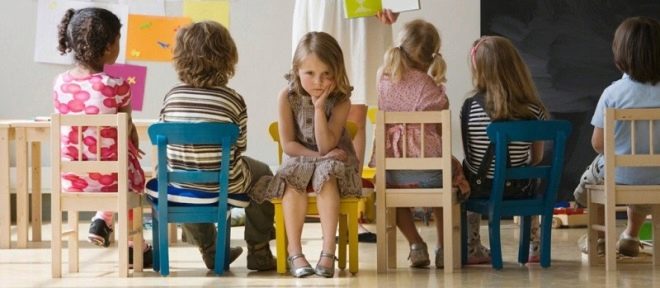A child is crying in kindergarten: advice from a psychologist
The first trip to kindergarten is a necessity, without which it cannot be avoided. Firstly, parents can hardly afford to bring up a child at home, because they need to go to work, secondly, only in kindergarten will he receive a sufficient amount of communication with peers and a lot of different knowledge that he will develop and prepare for school. Nevertheless, for a child who has been virtually inseparable from his mother and home all his life, this is a real challenge.
It is not surprising that many children cry in a similar situation, but it is almost impossible not to send them to kindergarten, therefore we will consider how to solve this problem.
Types of children
Do not send the child to kindergarten is too expensive, but you can at least more accurately determine the date of the first campaign - is it time to do it now or is it better to wait a little more. Parents are unlikely to be able to independently assess the level of readiness of the child, so you can turn to a psychologist. The latter distinguish three types of children:
- Well adaptable. If your baby is exactly like this, it means that you and he are lucky. Usually these children are open and friendly, so they quickly make new acquaintances, immediately attracting those around them. They are not afraid of new situations, if they do not carry a clear threat, so they feel as confident in the kindergarten as they would in any other place.
Due to the stability of their psyche, they very calmly perceive the separation from their parents, because even in a nursery, at a very early age, they will feel comfortable. Unfortunately, these children are relatively few.
- Medium adaptable. These can be called the absolute majority of children. In kindergarten for the first time they will be scared and uncomfortable, but this is only the first time. Such a child cries in kindergarten, usually only on the first day, and even then - not all, but only in the first couple of hours. Further adaptation occurs - the baby sees that nothing threatens him, and he is well treated, slowly begins to communicate with others and gradually becomes his own here.
- Poorly adaptable. The percentage of children of this type is also relatively low, but they can make life very difficult for their parents. They are very attached to mom and dad, and completely lose confidence in their absence and in an unfamiliar situation. Worst of all, such a baby doesn’t get used to it, it cries equally hard when it comes to the kindergarten for the first time, and when it’s already listed for the second month. For certain reasons, it is difficult for him to find friends, which only aggravates the problem.
Psychologists believe that the best age for sending children of this type to kindergarten is 4 years, so if there is an opportunity not to rush into admission, it is better to wait.
Objective reasons
The entire classification described is appropriate if the children of all the types mentioned are in exactly the same conditions, but in practice this is not the case. You’ve probably noticed that you seem to be even pulling for one job and going to another as if you were going to penal servitude. However, the desire or unwillingness to go to a specific job or to a particular kindergarten may be due to both permanent and non-permanent reasons, and sometimes the problem of children's tears can be solved by recognizing and eliminating such reasons. Here's what you should pay attention to:
- Bad adaptation - A universal answer to the question of why children do not want to go to kindergarten, but psychologists use this term only if a child in an unfamiliar environment is repelled and literally frightened by everything.But this concept can be divided into a number of smaller and specific reasons: one does not like to get up early and go somewhere in any bad weather, others feel insecure in a team (another question is in any, or this one), others simply do not want to obey others.
These are the same reasons for which you are not always happy to go to work, but you yourself have chosen it and can change it yourself, and the child can only complain and cry.
- Sometimes the reason for crying lies in not very good health condition. The child could only catch a cold, but this is a runny nose and a headache. In such a situation, adults are not too cheerful, and yet children are even harder to endure the discomfort. At the same time, in any kindergarten there are ideal conditions for the transmission of any infections - there are many children here, each of whom has an immune system.
- Sometimes children in kindergarten are trite not enough parents. It is clear that the first time they are not enough for everyone, but some are so accustomed to the fact that they are constantly taking care of, that now they are simply lost, and they do not understand what to do and how to behave. Speech about the lack of independence - perhaps, over time, the baby will find it, but for now it will have to be patient.
- Kids very much need to communicate - to a much greater extent than adults. As the classic said, you never feel so lonely anywhere, as in a crowd and children this can also be fully affected. Nobody seems to offend, but there is no special attention to you - how can you not be sad?
- The reason for the acute reluctance to attend kindergarten may be other children's behavior. It is no secret that children are creatures rather cruel, simply because they do not yet realize how much they are capable of offending another person. They may be teased and called out, but at that age the object of ridicule is not yet able to be critical of such situations and remain indifferent. Some people start calling names in response, or even throw themselves into a fight, while others get offended, feel a non-acceptance of themselves as a collective, and cry.
- The funny thing is that in some cases mom crying in kindergartenleading the kid. She is very worried, leaving her beloved child for the whole day in the company of other children, under the supervision of a good, but also someone else's aunt, so she can show her excitement or, even worse, even let a tear. Children feel such things very subtly and easily project their parents' emotions onto themselves. Simply put, this behavior of their mother frankly scares them.
What should parents not do in this situation?
Most parents sincerely want their child not to cry from the mere mention of the kindergarten, but their methods of achieving the goal sometimes openly surprising. Do not do some things that can exacerbate the problem - perhaps this is even enough:
- Some psychologists do not advise taking children to kindergarten at the age of 3-5 years (just when it usually happens in our country), because at this stage the complex reassessment of the world and children in the surrounding world takes place. They believe that it is better to have a child already before 3 years old - this is how he adapts faster.
- If the child has already gone to the kindergarten and is constantly crying there, don't scold him for that. First, the aggression will scare him even more and will be an additional reason for tears, and secondly, understand - he is just a little and needs protection.
- No need to make a child promise that he will no longer cry and all the more senseless then to appeal to what he promised. Even adults do not always deliberately keep their promises, but for a child this ritual is generally a complete abstraction, he still does not understand its essence, and may simply forget. In the end, he is not crying because he wants to get you, but because he cannot solve some of his own problem, so you'd better help him in this.
- In no case do not make fun of children's fears, and also it is not necessary to complain about this problem to anyone in the presence of the culprit. At kindergarten age, he is already able to compare himself with other children and it is very important for him to feel that his parents still love him, and here the older ones, it turns out, are dissatisfied with him.
- Top of parental nonsense - to scare the kid with the fact that for constant crying he will be left in kindergarten forever. By this, you create a clear association “kindergarten is a punishment”, and who would agree to endure punishment for every day, even if with breaks at night?
For the same reason, it’s not worthwhile to criticize educators with a child, even soundly - it’s hard to explain to a child why you consciously give it to your aunt, whom you yourself called bad.
- Do not even think of leaving the child at home simply because he cries and refuses to go to kindergarten. If he does not want to go there today, then why should he want to tomorrow? His opinion could have changed if he had gone there and saw that it was not so bad there, but if the reasons for not wanting were very specific, let him speak directly about them. Flowing tears, you just spoil the child and lose control of him.
- Children are afraid that their parents, leaving them in the garden, will not come after them - dissuade the child from the possibility of such a development, but do not use the word "soon." Children of younger kindergarten age have a very relative idea of time, especially since you did not leave them alone for a long time, so “soon” is a matter of minutes. Time is ticking, but mom still does not come - it turns out, she did not keep her promise. So, it may not come at all, and this is a good reason to cry.
How to help your child adapt?
Although many ridiculous attempts at solving a problem should be avoided, there are ways to effectively contribute to ensuring that a child of any type of adaptation acquires additional confidence and independence. This will not solve the problem instantly, and the baby may cry for another two or three months, but with the right approach you will achieve your goal in a maximum of six months, even in the most difficult cases (except for serious external causes for tears). So, the advice of a psychologist:
- The baby is very frightened by the fact that you used to leave him a maximum of half an hour, and now you’ve left him for a whole day. Teach him to kindergarten gradually - let him first go there for a couple of hours, then for three, and so on, to avoid excessive stress.
- Walk through several kindergartens, ideally with a baby. So you will find the best institution, and he will be able to pre-form an opinion about what is coming as something normal, not a problem.
- Let change come into the life of a child gradually. If he is used to sleeping for a long time and sitting at home most of the time, hold rehearsals - first just wake him up at the estimated time, then add fees, and then take him out for walks that will lead straight to kindergarten one day.
- If you donate your baby to kindergarten rather late, try to explain to him in words what is the use of new acquaintances and social circle. Do not forget that this is usually not given at the very first moment, so you first have to suffer a little.
- So that the child does not think that he was abandoned, give him a clear reference to the schedule, so that he knew that the parents really did not forget about him, it is just too early.
Do not specify the time and do not say abstractions, but name a specific point - after lunch, after a walk, after sleep.
- Let the kid learn to communicate with other children in advance - at least in the same sandbox. You can try to simulate the situation and at home, in a role-playing game based on the kindergarten.
- Let the little one take with him something familiar, dear to his heart. Best of all, of course, favorite toy.
- Try yourself not to create occasions for children's excitement. A child in the morning should not be wound, so do not be nervous and do not fuss, even if you suspect that you will be late for work.
- Demonstratively friendly talk with the staff of the institution - let the baby see that he is not left to anyone, but to really good aunts. Again, if the little one remains in good hands and is taken away later, then why does mom cry and don't want to say goodbye to the little one? Show your confidence that nothing bad can happen.
- In the evenings, be interested in the state of affairs of the child. Having independently spoken his day, he will understand. that nothing bad has happened, and if this happens every day, then there is nothing to fear there.
If there are some really bad phenomena, then you just learn about them, even if the kid himself for some reason did not tell about them.
In the next video, the psychologist will share with you practical tips on child's adaptation in kindergarten.


























